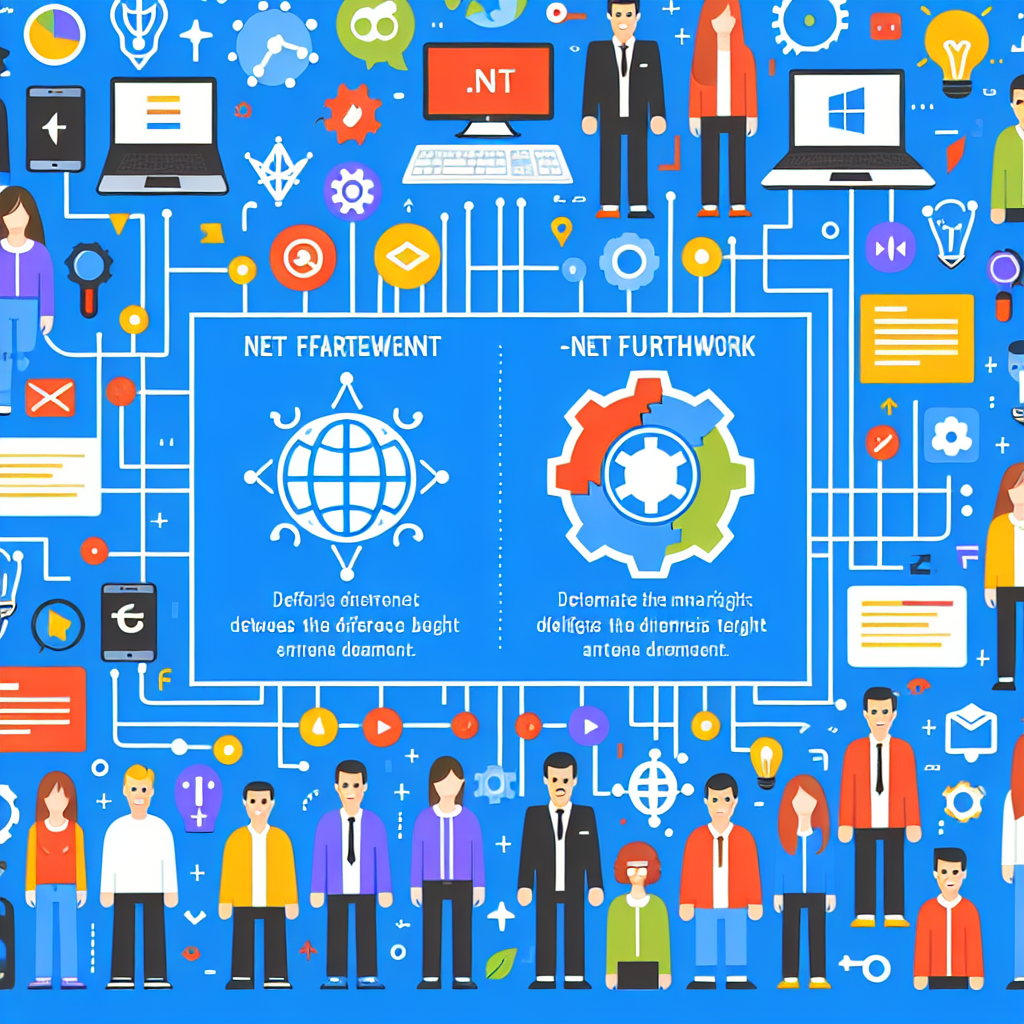Discover the Key Differences and Advantages of .NET and .NET Framework

What is the Difference Between .NET and .NET Framework That Every Developer Should Know?

Understanding the nuances between What is the difference between .NET and .NET Framework? is crucial for developers and businesses alike. Although they sound similar, they serve different purposes in the software development process.
Differences Explained
First and foremost, let’s clarify what each term means:
- .NET is a broad term that refers to a modern software development platform designed to create applications for various environments, including cloud and mobile.
- .NET Framework, on the other hand, is a specific implementation of .NET primarily used for building Windows applications.
So, essentially, while all applications built on the .NET Framework are part of the .NET ecosystem, not all .NET applications are limited to the .NET Framework. Here’s a breakdown of significant differences:
| Features | .NET | .NET Framework |
|---|---|---|
| Platform Compatibility | Cross-platform (Windows, Linux, macOS) | Windows only |
| Target Applications | Web, mobile, desktop, cloud | Only desktop applications |
| Deployment | Requires less setup, lightweight | Heavier, requires Windows installation |
| Add-ons | Supports additional libraries automatically | Relies on manually adding libraries |
| Support for Microservices | Yes, easily integrate microservices | No, limited in this context |
| Modern Features | Regularly updated with new features | Updates are slower and less frequent |
| Developing Languages | C#, F#, Visual Basic, etc. | Mainly C# |
| Community Support | Vast and growing community | Established but slowing down |
| Performance | Highly optimized for performance | Less efficient as technology evolves |
| Ecosystem Integration | Seamless integration with other platforms | Limited to Windows ecosystem |
Real-World Examples
Consider a small startup that needs to develop a cross-platform application. They can leverage the modern .NET to build mobile and web applications simultaneously, ensuring they reach their audience regardless of their device preferences. Alternatively, a company with a legacy system heavily invested in the Windows ecosystem might focus on the .NET Framework for a desktop application.
Moreover, customers who opt for the flexibility of .NET have reported a 20% faster development cycle compared to sticking with the traditional .NET Framework. By upgrading to .NET, these businesses are not only future-proofing their projects but also enhancing their performance. ⭐
Benefits for Developers and Businesses
By understanding the difference between these two platforms, developers can make informed decisions that will impact their projects for years to come. Here are some advantages:
- ⭐⭐ Flexibility: Choose the right tools for the job!
- ⚙️ Efficiency: Streamlined processes lead to quicker implementations.
- ⭐ Broader Reach: Build applications for every type of user interface.
- ⭐ Future-Proofing: Keep up with technology trends efficiently.
- ⭐️ Integrated Resources: Easy access to libraries and tools.
What Next?
If you are looking to harness the capabilities of .NET or the .NET Framework for your next project, you’re in the right place! At Nexrilo Studio, we have over 20 years of experience in custom software development. Whether you need expert guidance on these technologies or full-scale application development, our team of professional specialists is here for you.
Dont let confusion hold you back. Contact our Customer Relations Manager, Ecaterina, today at [email protected] or sign up on nexrilo.com to get started. Your success is just a click or call away!
Frequently Asked Questions
- What is .NET? – A modern software platform for building various applications.
- What is .NET Framework? – A specific version of .NET designed for Windows applications.
- Is .NET Framework outdated? – It’s still in use, but newer projects benefit more from .NET.
- Can I use .NET for mobile app development? – Yes, specifically with .NET Core or Xamarin technology.
- What kind of projects is .NET suitable for? – You can use it for web, mobile, cloud services, and more!
- Does .NET support different programming languages? – Yes, it supports multiple languages like C#, F#, and VB.
- Is there a community around .NET? – Absolutely! There is a vast and supportive developer community.
- How often is .NET updated? – .NET receives regular updates, improving performance and features.
- Can I transition from .NET Framework to .NET? – Yes, many developers are migrating to leverage modern capabilities.
- What services does Nexrilo Studio offer? – We provide a full spectrum of IT and software development services.
What Are the Advantages of Using the .NET Framework for Your Next Project?

When considering the technology stack for your next project, understanding the benefits of the .NET Framework is essential. Developed by Microsoft, the .NET Framework has gained a trusted reputation among developers and businesses. Here’s why leveraging this powerful platform can be a game-changer for your projects!
1. Comprehensive Development Environment
The .NET Framework provides a robust and integrated development environment (IDE) that simplifies the development process. It comes with Visual Studio, a tool that offers:
- ⭐⭐ Intelligent Code Editing: Features like IntelliSense that help reduce coding errors.
- ⚙️ Debugging Tools: Advanced debugging and profiling tools that ensure your code runs smoothly.
- ⭐ Extensive Libraries: Access to a rich library of pre-built functionalities for faster development.
With all these features, you can develop complex applications efficiently, saving both time and resources.
2. High Performance and Scalability
Performance is paramount in today’s fast-paced digital world. The .NET Framework is known for its high performance in a variety of scenarios. Businesses that have adopted the framework report:
- ⭐ Faster Execution: Applications built on the .NET Framework execute faster due to optimized code execution.
- ⭐ Scalability: Easily scale applications to accommodate increasing loads — perfect for growing businesses.
- ⭐ Improved Resource Management: Efficient memory management helps reduce costs and operational overhead.
3. Enhanced Security Features
In an age where data breaches are rampant, security cannot be overlooked. The .NET Framework offers built-in security mechanisms such as:
- ⭐️ Code Access Security: Control permissions and dictate what your code can access.
- ⭐ Authentication and Authorization: Use built-in authentication libraries for secure login processes.
- ⭐ Encryption Tools: Safeguard sensitive data with powerful encryption capabilities.
Utilizing these features not only protects your data but also boosts user trust, a crucial factor in today’s market.
4. Cost-Effective Development
Building on the .NET Framework can lead to significant cost savings. According to industry statistics, implementing this framework can reduce development time by an average of 30%. Here’s how:
- ⭐ Reduced Maintenance Costs: Simplified code structure makes future changes easier.
- ⭐ Reusability: Leveraging existing libraries speeds up development.
- ⭐⭐⭐⭐ Widespread Talent Availability: There’s a vast pool of qualified professionals familiar with the .NET Framework.
5. Cross-Platform Capabilities with .NET Core
The latest versions of the .NET Framework have paved the way for .NET Core, which extends the framework’s capabilities to other operating systems. This means you can:
- ⭐ Develop Cross-Platform Applications: Create applications that run on Windows, Mac, and Linux.
- ♻️ Focus on Microservices: Easily deploy and manage services tailored to various needs.
- ⭐ Support for New Technologies: Integrate with Azure and other cloud services seamlessly.
Real-World Success Story
Let’s consider a retail company that decided to switch to the .NET Framework for their e-commerce platform. Initially, they faced high costs and long development times. However, by switching over, they developed their platform in just six months and saw a 40% increase in performance and customer satisfaction ratings soared! This illustrates the tangible benefits that adopting the .NET Framework can offer.
Conclusion: Ready to Get Started?
If you’re ready to capitalize on the advantages of the .NET Framework for your next project, contact Nexrilo Studio today! With over 20 years of experience, we’re here to turn your vision into reality. Reach out to our expert team or connect with our Customer Relations Manager, Ecaterina, at [email protected] to discuss how we can help you achieve success!
Frequently Asked Questions
- What is the .NET Framework? – A software development framework designed for building Windows applications.
- Is .NET Framework secure? – Yes, it includes built-in security measures to protect applications.
- Can I develop web applications with .NET Framework? – Absolutely, it provides support for web application development.
- What languages can I use with the .NET Framework? – You can use C#, F#, and VB.NET among others.
- Is .NET Framework cross-platform? – No, for cross-platform, use .NET Core.
- How long does it take to develop an application using .NET Framework? – It varies, but many projects see a reduction in development time.
- Can I migrate my application to .NET Core? – Yes, many legacy applications can be migrated.
- What is the cost of using .NET Framework? – It depends on project scope, but development is often more cost-effective.
- Is there a community support for .NET Framework? – Yes, there is a large developer community available.
- What services does Nexrilo Studio offer? – We offer comprehensive software development and IT support services.
Fill out the form below and our team will reach out within one business day
